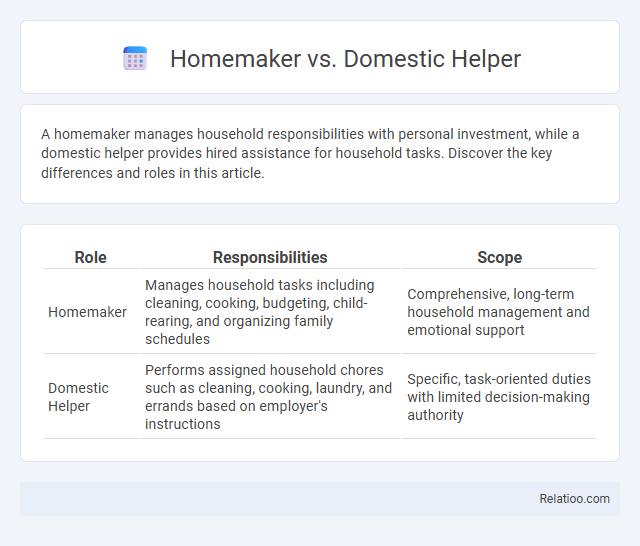A homemaker manages household responsibilities with personal investment, while a domestic helper provides hired assistance for household tasks. Discover the key differences and roles in this article.
Table of Comparison
| Role | Responsibilities | Scope |
|---|---|---|
| Homemaker | Manages household tasks including cleaning, cooking, budgeting, child-rearing, and organizing family schedules | Comprehensive, long-term household management and emotional support |
| Domestic Helper | Performs assigned household chores such as cleaning, cooking, laundry, and errands based on employer's instructions | Specific, task-oriented duties with limited decision-making authority |
Introduction to Homemaker and Domestic Helper Roles
The homemaker manages household responsibilities, including child care, meal preparation, and maintaining a clean, organized living space, often without formal employment status. A domestic helper performs similar tasks but is typically employed, providing services like cleaning, cooking, and caregiving in others' homes. Understanding the distinction between homemaker and domestic helper clarifies the nature of unpaid family labor versus paid domestic work.
Defining the Homemaker
A homemaker is an individual who manages household tasks, including cleaning, cooking, and childcare, to create a comfortable and organized living environment. Unlike a domestic helper, typically hired to perform specific duties, a homemaker often takes ownership of the entire household's day-to-day functioning. Understanding the role of a homemaker helps you appreciate the dedication involved in maintaining a nurturing home.
Understanding the Domestic Helper
A domestic helper primarily provides paid assistance with household chores, including cleaning, cooking, and childcare, distinguishing them from homemakers who manage these tasks personally. While homemakers typically oversee and maintain the home environment as a full-time role, domestic helpers supplement household labor under employer supervision. Understanding the domestic helper's role highlights the economic and social dynamics of paid domestic work within private households.
Key Responsibilities of a Homemaker
A homemaker primarily manages household tasks such as cleaning, cooking, budgeting, and organizing daily family activities to maintain a well-functioning home environment. Unlike domestic helpers who typically focus on assigned chores, a homemaker takes comprehensive responsibility for the overall upkeep and emotional well-being of the household. Your role as a homemaker involves not only physical maintenance but also nurturing family relationships and ensuring a balanced, supportive home life.
Core Duties of a Domestic Helper
Core duties of a domestic helper include cleaning, cooking, laundry, and general household maintenance, ensuring your home runs smoothly and efficiently. Unlike homemakers who primarily manage household affairs and family care, domestic helpers provide hands-on, routine assistance with chores that demand physical labor. Their role is centered on practical support, allowing you to focus on other responsibilities while maintaining a clean and organized living environment.
Skills Required for Each Role
Homemakers require strong organizational, multitasking, and time management skills to maintain a well-functioning household and ensure family well-being. Domestic helpers must possess practical cleaning, cooking, and basic caregiving skills, along with adaptability and reliability to support daily household operations effectively. Your choice between these roles depends on which specific skills you want to develop and the responsibilities you prefer to manage in a home setting.
Cultural Perceptions and Societal Value
Cultural perceptions of homemakers often emphasize their role in nurturing family bonds and maintaining household harmony, reflecting traditional values that celebrate domestic stewardship. Domestic helpers, viewed primarily as paid workers, can experience varied societal value depending on regional attitudes towards labor and class distinctions, sometimes facing undervaluation despite their essential contributions. Your understanding of these roles can highlight the complex interplay between social status, economic factors, and cultural expectations shaping each position's recognition and respect within different communities.
Legal Rights and Employment Status
A Homemaker typically lacks formal employment status and legal rights, as their work is unpaid and not governed by labor laws. A Domestic Helper holds an official employment contract, granting them legally protected rights such as minimum wage, working hours, and social benefits under labor regulations. Understanding these distinctions helps You ensure compliance with legal obligations and protect workers' rights in domestic settings.
Economic Impact and Compensation Differences
Homemakers primarily contribute to household economic stability through unpaid labor, which remains undervalued compared to domestic helpers who receive monetary compensation for similar tasks. Domestic helpers generate direct economic activity by participating in the formal or informal labor market, often earning wages that reflect regional labor standards but typically lack benefits and job security. Differences in compensation between homemakers and domestic helpers highlight broader socioeconomic disparities, influencing household income distribution and the valuation of domestic work within the economy.
Choosing Between Homemaker and Domestic Helper
Choosing between a homemaker and a domestic helper depends on your specific needs and lifestyle. A homemaker is someone who manages household tasks and cares for the family full-time, providing personalized attention and emotional support. In contrast, a domestic helper performs household chores such as cleaning, cooking, and maintenance, typically on a paid basis, offering practical assistance but less personal involvement.

Infographic: Homemaker vs Domestic Helper
 relatioo.com
relatioo.com